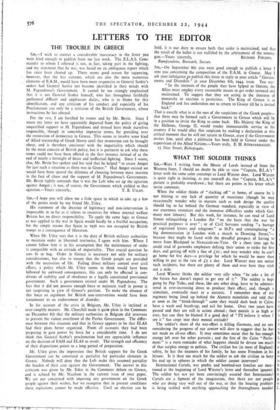Ste,—I hope you will allow me a little space in
which to take up a few of the points made by my friend Mr. Utley.
His statement of the doctrine of legitimacy and non-intervention is impeccable in so far as it relates to countries for whose internal welfare Britain has no direct responsibility. To apply the same logic to Greece as was applied to the war in Spain would hardly be a fruitful occupation, for the simple reason that Spain in 1936 was not occupied by British troops as a consequence of liberation.
When Mr. Utley says that it is the duty of British military authorities to maintain order in liberated territories, I agree with him. Where I cannot follow him is in his assumption that the maintenance of order is compatible with an attitude of impartiality. That crucial question he sees fit to beg. Order in Greece is necessary not only for military considerations, but also to ensure that the Greek people are provided with the necessities of life. Failing direct military control over civil affairs, a policy which Mr. Utley seems to think would have been followed by awkward consequences, this can only be effected in con- ditions of stability and of obedience to a legally constituted provisional government. Such a government existed under M. Papandreou. The fact that it did not possess enough force to maintain itself in power is not surprising in view of Greece's position. To make the absence of this force an argument for British non-intervention would have been tantamount to an endorsement of disorder.
In his account of the crisis in Belgium, Mr. Utley is inclined to over-simplify matters. Mr. Churchill made it quite plain in the Commons on December 8th that the military authorities in Belgium did intervene to prevent the violent overthrow of the Pierlot Government. The differ- ence between this situation and that in Greece appears to be that ELAS had their plans better organised. From all accounts they had been preparing to gain power by force for a considerable time. I do not think that General Scobie's proclamation had any appreciable influence on the decision of EAM and ELAS to revolt. The strength and efficiency of their dispositions points to a long period of preparation.
Mr. Utley gives the impression that British support for the Greek Government can be construed as partiality for particular elements in Greece. Nobody will deny that the Left make this assumed partiality the burden of their case against the Government. The answer to this criticism was given by Mr. Eden in the Commons debate on Greece, and is echoed by Mr. Nicolson in the current issue of your paper. We are not concerned with imposing any government on the Greek people against their wishes, but we recognise that in present conditions those aspirations cannot be made effective. Until an election can be held, it is our duty to ensure both that order is maintained, and that the result of the ballot is not nullified by the arbitrament of the tommy-


























 Previous page
Previous page